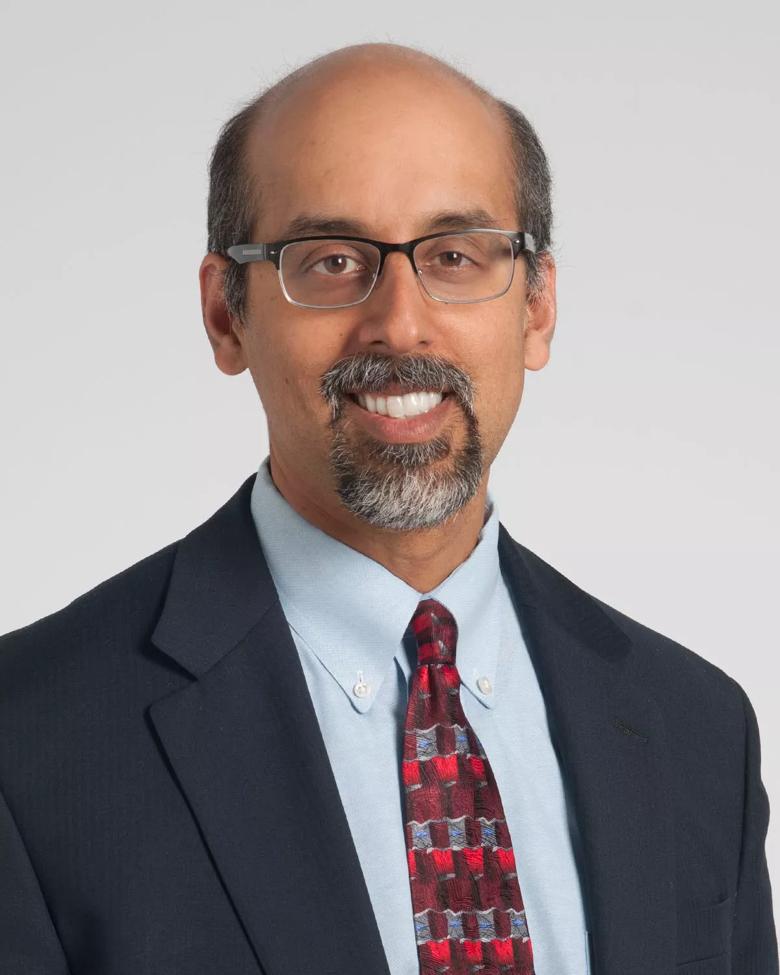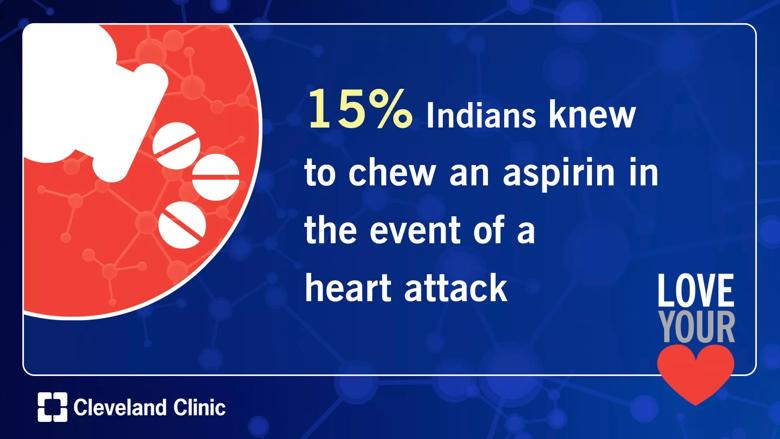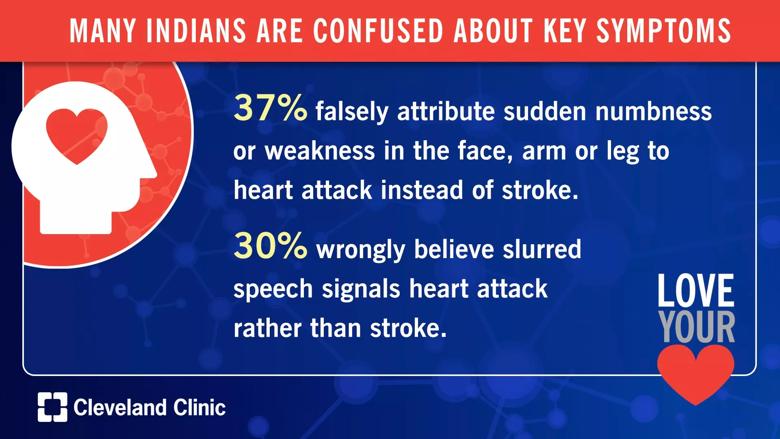Survey by leading U.S. hospital Cleveland Clinic shows clear need for greater heart attack awareness among Indian public
Cleveland Clinic News Service | 216.444.0141
We’re available to shoot custom interviews & b-roll for media outlets upon request.
CCNS health and medical content is consumer-friendly, professional broadcast quality (available in HD), and available to media outlets each day.

Leading heart physicians at U.S.-based Cleveland Clinic say there is a clear need for greater heart attack awareness in India, after a survey found one-in-four Indians could not recognize signs of a heart attack, and more than half could not identify a correct first response to a heart attack.

Image content: This image is available to view online.
View image online (https://assets.clevelandclinic.org/transform/497f7a21-fbf3-4c53-9307-23430617f1a6/Khot_Umesh_572469_jpg)
Umesh Khot, M.D., vice chairman of cardiovascular medicine at Cleveland Clinic
Heart disease is the No. 1 cause of death around the world. The survey was conducted as part of Cleveland Clinic’s “Love your Heart” consumer education campaign. Cleveland Clinic has been ranked America’s No. 1 hospital for cardiology and cardiac surgery for 23 years in a row by US News & World Report.
“India is going through a major epidemic of heart disease. As patients are living longer and having changes in their diet and lifestyle, Indians now have one of the highest risk of heart disease in the world,” said Umesh Khot, M.D., vice chairman of cardiovascular medicine at Cleveland Clinic. “Recognizing the disease, getting to medical care and then getting proper treatment as quickly as possible is really the key to surviving the heart attack and living after that.”
When it comes to their own heart emergencies, Indians need additional education in identifying and responding to a heart attack. The survey found when asking what was the “thing to do first” in the event of a possible heart attack, less than half were able to identify one of two correct responses.
Only 15 percent said they would chew an aspirin as a first response – a first step to take when experiencing a heart attack. The common headache tablet is known to slow blood clotting and reduce the severity of a heart attack until help arrives, and chewing rather than swallowing the tablet whole helps the body absorb it faster.
Another 26 percent said they would call an ambulance, which is usually recommended as the best way to reach medical care because it provides life-saving emergency care on the way. However, Dr. Khot noted this would not be the case in areas where ambulances would be too slow to arrive.

Image content: This image is available to view online.
View image online (https://assets.clevelandclinic.org/transform/f10dbec2-9dc9-42c9-817b-e88fde3f13ca/heart-india-2018-CCC-184-AsprnIndian-1920x1080_jpg)
“The most important thing is that if you’re having symptoms as far as chest pain or chest discomfort, or shortness of breath, discomfort radiating to one or both arms or into the neck, it’s important to seek medical care as soon as possible. Exactly how to do that really depends on where you live,” Dr. Khot added. “In some places there are ambulance services that can take patients rapidly, in other places they don’t have that and patients have to get care through their own transportation or to seek transportation but the key thing is to not wait.”

Image content: This image is available to view online.
View image online (https://assets.clevelandclinic.org/transform/71b2af12-333e-4f15-8bb3-b370b1470b63/heart-india-2018-CCC-184-indianVers-1920x1080_jpg)
However, 14 percent said they would call their physician, and, 9 percent said they would rest and drink cold water.
Although three-fourths of people could identify “pressure, squeezing, fullness or pain in the center of your chest” as a heart attack symptom, a significant number confused signs of a stroke with symptoms of a heart attack. A little over one-third (37 percent) of people wrongly identified “sudden numbness or weakness of face, arm or leg,” 30 percent wrongly identified “slurred speech,” and 22 percent wrongly identified “sudden trouble seeing in one or both eyes.”
Sixty-two percent correctly identified shortness of breath as a heart attack symptom, in addition to 52 percent who correctly identified “pain in one or both arms.”
Patients travel to Cleveland Clinic, located in Cleveland, Ohio, from around 185 countries every year for treatment, including locations in Weston, Fla.; Las Vegas, Nev.; Toronto, Canada; Abu Dhabi, UAE; and London, England to open in late 2020.
An interview with Dr. Umesh Khot can be viewed below. Click HERE to download the interview.
Video content: This video is available to watch online.
View video online (https://www.youtube.com/embed/lk9nEbL6ix8?feature=oembed&wmode=transparent)
Methodology: Cleveland Clinic’s survey of the general population to gathered insights into perceptions of heart disease. This was an online survey conducted among a nationally representative sample, consisting of 1,005 adults, fifty-one percent male and forty-nine percent female 18 years of age and older, in India. We have weighted the numbers to be nationally representative. This online survey was conducted by YouGov between January 3 and 10, 2018.
Cleveland Clinic is a nonprofit multispecialty academic medical center that integrates clinical and hospital care with research and education. Located in Cleveland, Ohio, it was founded in 1921 by four renowned physicians with a vision of providing outstanding patient care based upon the principles of cooperation, compassion and innovation. Cleveland Clinic has pioneered many medical breakthroughs, including coronary artery bypass surgery and the first face transplant in the United States. Cleveland Clinic is consistently recognized in the U.S. and throughout the world for its expertise and care. Among Cleveland Clinic’s 82,600 employees worldwide are more than 5,786 salaried physicians and researchers, and 20,700 registered nurses and advanced practice providers, representing 140 medical specialties and subspecialties. Cleveland Clinic is a 6,728-bed health system that includes a 173-acre main campus near downtown Cleveland, 23 hospitals, 280 outpatient facilities, including locations in northeast Ohio; Florida; Las Vegas, Nevada; Toronto, Canada; Abu Dhabi, UAE; and London, England. In 2024, there were 15.7 million outpatient encounters, 333,000 hospital admissions and observations, and 320,000 surgeries and procedures throughout Cleveland Clinic’s health system. Patients came for treatment from every state and 112 countries. Visit us at clevelandclinic.org. Follow us at x.com/CleClinicNews. News and resources are available at newsroom.clevelandclinic.org.
Editor’s Note: Cleveland Clinic News Service is available to provide broadcast-quality interviews and B-roll upon request.